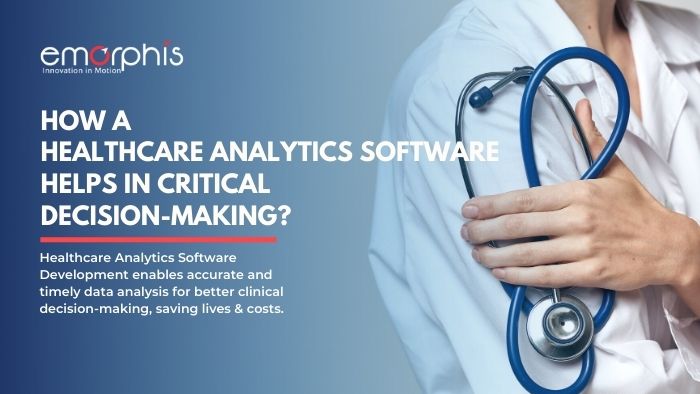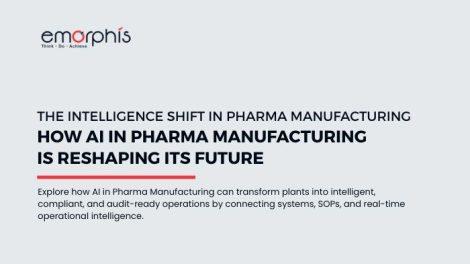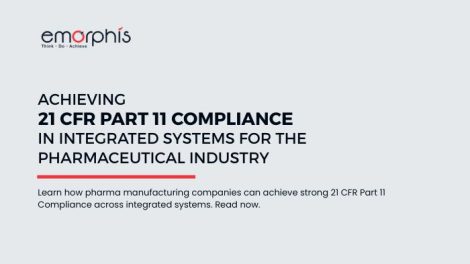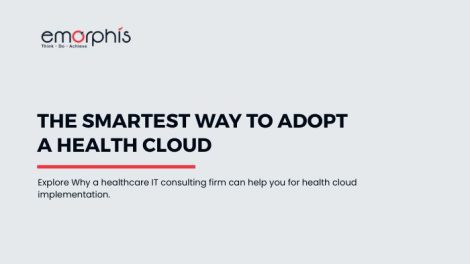Were you aware of the pivotal role played by healthcare analytics software development during the COVID-19 pandemic?
Indeed, numerous nations have leveraged healthcare analytics to counter the pandemic and improve citizen welfare. South Korea, specifically, earned accolades for its effective response, which relied heavily on health data. The government used big data analytics to track the spread of the virus. Also, identify high-risk areas, and optimize testing and contact tracing efforts. Leading to making crucial decisions.
So, let’s check in detail about healthcare analytics software.
What is Healthcare Analytics Software Development?
As technology advances, data reigns supreme in any software’s marketability, including healthcare analytics software. In healthcare, decisions impact human lives, making data-driven decisions critical.
A recent survey reveals that the healthcare industry generates vast amounts of data through electronic medical records (EMR), electronic health records (EHR), and health information exchange (HIE). However, the challenge lies in effectively analyzing and utilizing this data to improve decision-making and manage the data efficiently. Healthcare analytics software development services present a solution to these challenges.
This software plays a crucial role in decision-making by providing insights and data-driven recommendations based on analyzing extensive healthcare data. The software identifies trends, patterns, and relationships within the data, which can inform decisions related to patient care, resource allocation, and financial management. It leads to more efficient and effective healthcare delivery and improved patient outcomes.
Patients are the primary beneficiaries of healthcare analytics software development. It significantly improves medical system efficiency and patient care, reducing unnecessary expenditures and resource waste. Moreover, it saves time for doctors and physicians overburdened with unceasing inputs and readouts, allowing them to provide better patient care.
Three Effective Uses of Statistical Data Analytics in Making Healthcare Decisions
Statistical data analytics is a powerful tool that can assist in making improved healthcare decisions. This method of data analysis involves using statistical techniques to extract meaningful insights from large amounts of data.
Adopting statistical data analytics in healthcare can provide many benefits, including:
I. Improved patient outcomes
By analyzing data on patient outcomes, healthcare providers can identify patterns and trends that can inform treatment decisions. For example, data analytics assist in determining which medications are most effective for specific conditions or which treatments have the best success rates. As a result, patients may receive more successful therapies with better results.
Check out Healthcare Portfolio for some relevant examples.
II. Increased efficiency
Data analytics can help healthcare providers use their resources better by identifying areas to improve. For example, data analysis can help determine which procedures are taking the longest and why allowing providers to make changes that will speed up the process. Additionally, data analytics can help providers identify patients at the highest risk for complications, allowing them to focus their resources on those patients.
III. Reduced costs
Data analytics can also help healthcare providers reduce costs by identifying areas where money is being wasted. For example, data analysis can help determine which procedures are being overused, which medications are being prescribed unnecessarily, and which treatments are not providing the best value. By making changes in these areas, healthcare providers can reduce costs and improve the overall efficiency of the healthcare system. By adopting this method of data analysis, healthcare providers can take advantage of the many benefits it has to offer.
Now, let’s check with some use cases.
The Efficient Use Of Data
The topic becomes more interesting when healthcare analytics is used in Population Health Management. By analyzing big data from various sources. Healthcare analytics software can provide a comprehensive view of a particular population’s health status and needs. In Brown County, Minnesota, there is a city called New Ulm. In New Ulm, hospitals, community leaders, and public health officials worked together to prevent heart disease and high blood pressure. Health officials employed data analytics and transparency surrounding hospitalization costs. This helped to shift from a strategy centered on treatment to one that focused on prevention. As a matter of fact, it helps in enhancing the community’s health. The study results show an 11% increase in residents with blood pressure in the healthy range. And also a nearly 40% increase in residents who exercise 150 minutes per week.
Furthermore, analytics software can support clinical research. The software can analyze large amounts of patient data to identify potential associations between different factors and patient outcomes. This can inform the development of new treatments or interventions. And can also be used to monitor the effectiveness of existing treatments over time.
So what’s the technology behind it, let’s have a look.
Big Data Analytics
Big data analytics refers to the process of analyzing and deriving insights from large and complex data sets that are too large to be managed and processed using traditional data processing methods. With the exponential growth in data volume, velocity, and variety, big data analytics has emerged as a critical discipline that enables organizations to extract valuable insights from the massive amounts of data they generate and collect.
Big data analytics typically involves the use of advanced analytical techniques such as predictive modeling, data mining, machine learning, and natural language processing to uncover patterns, trends, and insights that can inform decision-making, improve business operations, and drive innovation. The process involves collecting, storing, processing, and analyzing large volumes of data from a variety of sources, including social media, internet searches, customer interactions, sensors, and other sources of structured and unstructured data.
An Emerging Tool In Healthcare Decision-Making
The COVID-19 pandemic has underscored the critical importance of healthcare analytics software development. Health big data has become essential in tracking and predicting the virus’s spread. Also, enables researchers to identify patterns and trends that can inform decisions related to testing, lockdowns, and other measures. This has empowered governments and public health organizations to take proactive steps.
In addition, analytics has also played a crucial role in tracking the distribution of vaccines. By analyzing data on the number of doses administered and people vaccinated, researchers and public health officials can monitor the progress of the vaccination effort, identify areas that require more resources, and track the effectiveness of different vaccines. Overall, healthcare analytics software development is a vital tool in helping the world’s people healthy.
So, by leveraging the power of big data analytics, healthcare analytics software development can help various types of organizations. Organizations including healthcare service providers, healthcare device and product manufacturers, pharmaceutical companies, and also insurance providers can gain a competitive advantage. Also, improve customer experiences, reduce costs, and drive growth and innovation.
Let’s check in detail about healthcare analytics software development services
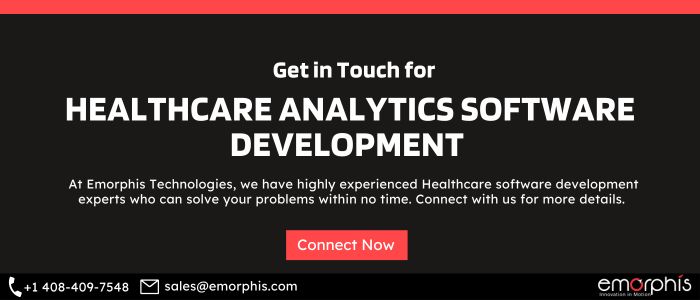
Healthcare Analytics Software Development
Healthcare analytics software development involves designing and creating software tools that can analyze and interpret healthcare data. This data can include patient records, medical images, lab results, and financial data. The goal of healthcare analytics software is to help healthcare providers make better decisions, improve patient outcomes, and reduce costs.
Overall, healthcare analytics software development requires a deep understanding of healthcare data, as well as expertise in software product engineering development services and data analytics.
The development process for healthcare analytics software typically involves several steps:
1. Define the requirements
The first step is to identify the key features and requirements of the software. This includes identifying the types of data that will be analyzed, the algorithms and models that will be used, and the user interface.
2. Design the software architecture
Once the requirements have been defined, the next step is to design the software architecture. This involves creating a high-level overview of the software, including the different components and how they will interact with each other.
3. Develop the software
After the architecture has been designed, the software development process can begin. This involves writing code, testing the software, and debugging any issues that arise.
4. Integrate the software
Once the software has been developed, it needs to be integrated into the healthcare system. This involves connecting the software to the data sources and ensuring that it can interact with other healthcare systems.
5. Test and deploy the software
Before the software can be used in a clinical setting, it needs to be thoroughly tested and validated. This includes testing the software for accuracy, reliability, and usability. Once the software has been validated, it can be deployed and used in clinical practice.
6. Maintain and update the software
Healthcare analytics software needs to be regularly maintained and updated to ensure that it continues to work properly and remains up-to-date with the latest healthcare standards and regulations.
So why you should choose to develop custom healthcare software development services or healthcare analytics software solutions for your organization? Let’s check the benefits now.
Benefits of healthcare software development for analytics software solutions
Healthcare software development for analytics software can provide a wide range of benefits to healthcare providers, patients, and other stakeholders. Some of the key benefits include:
a. Improved patient outcomes
Healthcare analytics software can help providers identify patients who are at risk of developing certain conditions, allowing them to intervene early and also provide more targeted care. This can lead to better outcomes for patients, including improved health and reduced healthcare costs.
b. Better resource allocation
Healthcare analytics software can help providers identify areas where resources are being underutilized or overutilized. By optimizing resource allocation, providers can improve efficiency and reduce costs while still providing high-quality care.
c. Enhanced decision-making
Healthcare analytics software can provide providers with access to real-time data and also analytics, allowing them to make more informed decisions about patient care. This can help providers identify trends and patterns in patient data that may be missed using traditional methods.
d. Improved operational efficiency
Healthcare analytics software can help providers streamline administrative tasks and reduce paperwork. This can help providers save time and reduce costs while improving overall efficiency.
e. Better patient engagement
Healthcare analytics software can help providers engage patients more effectively, by providing them with personalized health information and education. This can help patients take a more active role in their own care and improve overall health outcomes.
Overall, software development for healthcare analytics solutions or systems can help providers improve patient outcomes, reduce costs, and increase operational efficiency. By leveraging the power of data analytics, healthcare providers can make more informed decisions and provide higher-quality care to their patients.
Let’s look for the benefits big data analytics can help in patient care.
How Big Data analytics technology can improve patient care?
As it’s the near future of healthcare. Big data analytics services and solutions have the potential to revolutionize patient care in several ways. By analyzing large amounts of healthcare data. As a matter of fact, medical professionals can quickly gain new insights into spreading disease patterns. This also helps in monitoring treatment effectiveness and patient outcomes to help prevent people from infections.
One of the key benefits of big data analytics in healthcare is identifying patterns and trends in patient data that may take time to get through. For example, by analyzing electronic health records (EHRs), doctors and researchers can identify common risk factors for a particular disease or identify early warning signs of a potential health problem.
Another benefit of big data analytics is improving the accuracy of diagnoses and treatment plans. Doctors can make more informed decisions about a patient’s care by analyzing large amounts of data from multiple sources, such as imaging scans, lab results, and patient symptoms. Additionally, big data analytics can identify potential drug interactions or side effects, helping to improve patient safety.
Big data and analytics software solution development services also assist providers in improving patient outcomes by identifying and addressing areas of inefficiency in the healthcare system. Healthcare organizations can identify bottlenecks and improve patient care by analyzing wait times, resource utilization, and patient flow. In addition, it can predict which patients are at risk of readmission, allowing hospitals to take proactive steps to prevent readmissions and reduce healthcare costs.
Data Analytics Can Improve Financial Performance
Data analytics can play a crucial role in improving financial performance in the healthcare sector by providing insights that can help organizations make more informed decisions.
One way data analytics can improve financial performance is by identifying areas of inefficiency and waste. For example, by analyzing data on patient outcomes, healthcare organizations can identify patterns of care that lead to better results at lower costs. This information assists in guiding changes in care delivery, leading to improved patient outcomes and reduced costs.
Data analytics can also help healthcare organizations better manage their expenses. For example, by analyzing data on supply chain costs, healthcare organizations can identify opportunities to negotiate better prices with suppliers or find alternative suppliers. This can help reduce costs and improve financial performance.
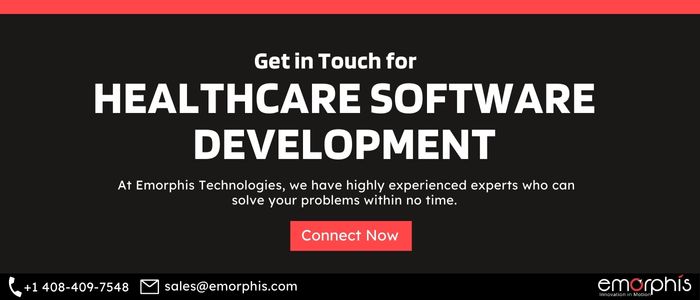
Conclusion
In conclusion, data analytics can play a critical role in improving decision-making in the healthcare sector. By providing healthcare providers with a more complete picture of a patient’s health, identifying patterns and trends in patient care, helping in resource allocation, and predicting future health trends, data analytics can help healthcare providers make more informed decisions and improve the quality of care for patients.
With the increasing amount of data available in healthcare, analytics software can help healthcare providers make better decisions about patient care, improve operational efficiency, and reduce costs.
The development of healthcare analytics software requires expertise in data science, machine learning, and healthcare regulations. The software must be able to collect, process, and analyze large amounts of healthcare data, including patient records, clinical data, and billing information. It must also comply with privacy and security regulations, such as HIPAA, to protect patient confidentiality.
Connect with Emorphis Technologies healthcare software development for analytics solutions. We are a team of experienced developers and data scientists who can design and develop custom healthcare analytics solutions to meet your specific needs. Healthcare data is sensitive and must be protected. We understand the importance of data security and comply with all relevant regulations, including HIPAA, to ensure patient privacy. Emorphis also offers custom healthcare software development services.
Overall, healthcare analytics software development is an exciting and challenging field. It requires a combination of technical expertise and healthcare knowledge. As the healthcare industry continues to evolve and generate more data. The demand for healthcare analytics software is only going to increase.
Check how technology is helping various key healthcare settings – How to Simplify Clinical Communication and Collaboration with Healthcare IT Solutions?



